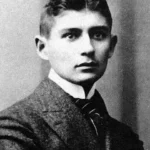 | |
In the Penal Colony | |
| Author | Franz Kafka |
|---|---|
| Published |
1899
|
| Language | English |
| Original Language | German |
| Nationality | Czech, German |
| Genre | Absurdist Fiction, Existentialism |
1899 Short Story
In the Penal Colony
In the Penal Colony is an English Absurdist Fiction, Existentialism short story by Czech, German writer Franz Kafka. It was first published in 1899.
In the Penal Colony
by Franz Kafka
Its a remarkable apparatus, said the Officer to the Explorer and gazed with a certain look of admiration at the device, with which he was, of course, thoroughly familiar. It appeared that the Traveller had responded to the invitation of the Commandant only out of politeness, when he had been asked to attend the execution of a soldier condemned for disobeying and insulting his superior. Interest in this execution was not really very high even in the penal colony itself. At least, here in the small, deep, sandy valley, closed in on all sides by barren slopes, apart from the Officer and the Traveller there were present only the Condemned, a vacant-looking man with a broad mouth and dilapidated hair and face, and the Soldier, who held the heavy chain to which were connected the small chains which bound the Condemned Man by his feet and wrist bones, as well as by his neck, and which were also linked to each other by connecting chains. The Condemned Man, incidentally, had an expression of such dog-like resignation that it looked as if one could set him free to roam around the slopes and would only have to whistle at the start of the execution for him to return.
The Traveller had little interest in the apparatus and walked back and forth behind the Condemned Man, almost visibly indifferent, while the Officer took care of the final preparations. Sometimes he crawled under the apparatus, which was built deep into the earth, and sometimes he climbed up a ladder to inspect the upper parts. These were jobs which really could have been left to a mechanic, but the Officer carried them out with great enthusiasm, maybe because he was particularly fond of this apparatus or maybe because there was some other reason why the work could not be entrusted to anyone else. Its all ready now! he finally cried and climbed back down the ladder. He was unusually tired, breathing with his mouth wide open, and he had pushed two fine ladys handkerchiefs under the collar of his uniform at the back. These uniforms are really too heavy for the tropics, the Traveller said, instead of asking some questions about the apparatus, as the Officer had expected. Thats true, said the Officer. He washed the oil and grease from his dirty hands in a bucket of water standing ready, But they mean home, and we dont want to lose our homeland. Now, have a look at this apparatus, he added immediately, drying his hands with a towel and at the same time pointing to the apparatus. Up to this point I still had to do some work by hand, but from now on the apparatus works entirely on its own. The Traveller nodded and followed the Officer. The latter tried to protect himself against all eventualities by saying, Of course, breakdowns do happen. I really hope none will occur today, but we must be prepared for them. The apparatus is supposed to keep going for twelve hours without interruption. But if any breakdowns occur, they are only very minor, and will be dealt with right away.
Dont you want to sit down? he asked finally. He pulled out a chair from a pile of cane chairs and offered it to the Traveller. The latter could not refuse. He was now sitting on the edge of a pit, into which he cast a fleeting glance. It was not very deep. On one side of the hole the piled earth was heaped up into a wall; on the other side stood the apparatus. I dont know, the Officer said, whether the Commandant has already explained the apparatus to you. The Traveller made a vague gesture with his hand. That was good enough for the Officer, for now he could explain the apparatus himself. This apparatus, he said, grasping a connecting rod and leaning against it, is our previous Commandants invention. I also worked with him on the very first tests and took part in all the work right up to its completion. However, the credit for the invention belongs entirely to him alone. Have you heard of our previous Commandant? No? Well, Im not claiming too much when I say that the organization of the entire penal colony is his work. We, his friends, already knew at the time of his death that the administration of the colony was so self-contained that even if his successor had a thousand new plans in mind, he would not be able to alter anything of the old plan, at least not for several years. And our prediction has held. The New Commandant has had to recognize that. Its a shame that you didnt know the previous Commandant! However, the Officer said, interrupting himself, Im chattering, and his apparatus stands here in front of us. As you see, it consists of three parts. With the passage of time certain popular names have been developed for each of these parts. The one underneath is called the Bed, the upper one is called the Inscriber, and here in the middle, this moving part is called the Harrow. The Harrow? the Traveller asked. He had not been listening with full attention. The sun was excessively strong, trapped in the shadowless valley, and one could hardly collect ones thoughts. So the Officer appeared to him all the more admirable in his tight tunic weighed down with epaulettes and festooned with braid, ready to go on parade, as he explained the matter so eagerly and, in addition, while he was talking, still kept adjusting screws here and there with a screwdriver. The Soldier appeared to be in a state similar to the Traveller. He had wound the Condemned Mans chain around both his wrists and was supporting himself with his hand on his weapon, letting his head hang backward, not bothering about anything. The Traveller was not surprised at that, for the Officer spoke French, and clearly neither the Soldier nor the Condemned Man understood the language. So it was certainly all the more striking that the Condemned Man, in spite of that, did what he could to follow the Officers explanations. With a sort of sleepy persistence he kept directing his gaze to the place where the Officer had just pointed, and when a question from the Traveller interrupted the Officer, the Condemned Man looked at the Traveller, too, just as the Officer was doing.
Yes, the Harrow, said the Officer. The name fits. The needles are arranged as in a harrow, and the whole thing is driven like a harrow, although it stays in one place and is, in principle, much more artistic. Anyway, youll understand in a moment. The condemned is laid out here on the Bed. Ill describe the apparatus first and only then let the procedure go to work. That way youll be able to follow it better. Also a sprocket in the Inscriber is excessively worn. It really squeaks. When its in motion one can hardly make oneself understood. Unfortunately replacement parts are difficult to come by in this place. So, here is the Bed, as I said. The whole thing is completely covered with a layer of cotton wool, the purpose of which youll find out in a moment. The condemned man is laid out on his stomach on this cotton woolnaked, of course. There are straps for the hands here, for the feet here, and for the throat here, to tie him in securely. At the head of the Bed here, where the man, as I have mentioned, first lies face down, is this small protruding lump of felt, which can easily be adjusted so that it presses right into the mans mouth. Its purpose is to prevent him screaming and biting his tongue to pieces. Of course, the man has to let the felt in his mouthotherwise the straps around his throat will break his neck. Thats cotton wool? asked the Traveller and bent down. Yes, it is, said the Officer smiling, feel it for yourself. He took the Travellers hand and led him over to the Bed. Its a specially prepared cotton wool. Thats why it looks so unrecognizable. Ill get around to mentioning its purpose in a moment. The Traveller was already being won over a little to the apparatus. With his hand over his eyes to protect them from the sun, he looked up at the height of the apparatus. It was a massive construction. The Bed and the Inscriber were the same size and looked like two dark chests. The Inscriber was set about two metres above the Bed, and the two were joined together at the corners by four brass rods, which almost reflected rays from the sun. The Harrow hung between the chests on a band of steel.
The Officer had hardly noticed the earlier indifference of the Traveller, but he did have a sense now of how the latters interest was being aroused now. So he paused in his explanation in order to allow the Traveller time to observe the apparatus undisturbed. The Condemned Man imitated the Traveller, but since he could not put his hand over his eyes, he blinked upward with his eyes uncovered.
So now the man is lying down, said the Traveller. He leaned back in his chair and crossed his legs.
Yes, said the Officer. He pushed his cap back a little and ran his hand over his hot face. Now, listen. Both the Bed and the Inscriber have their own electric batteries. The Bed needs them for itself, and the Inscriber for the Harrow. As soon as the man is strapped in securely, the Bed is set in motion. It quivers with tiny, very rapid oscillations from side to side and up and down simultaneously. You will have seen similar devices in mental hospitals. Only with our Bed all movements are precisely calibrated, for they must be meticulously coordinated with the movements of the Harrow. But its the Harrow which has the job of actually carrying out the sentence.
What is the sentence? the Traveller asked. You dont even know that? asked the Officer in astonishment and bit his lip. Forgive me if my explanations are perhaps confused. I really do beg your pardon. Previously it was the Commandants habit to provide such explanations. But the New Commandant has excused himself from this honourable duty. However, the fact that with such an eminent visitorthe Traveller tried to deflect the honour with both hands, but the Officer insisted on the expressionthat with such an eminent visitor he didnt even once make him aware of the form of our sentencing is yet again something new, which. . . . He had a curse on his lips, but controlled himself and said merely: I was not informed about it. Its not my fault. In any case, I am certainly the person best able to explain our style of sentencing, for here I am carryinghe patted his breast pocketthe relevant diagrams drawn by the previous Commandant.
Diagrams made by the Commandant himself? asked the Traveller. Then was he in his own person a combination of everything? Was he soldier, judge, engineer, chemist, and draftsman?
He was indeed, said the Officer, nodding his head with a fixed and thoughtful expression. Then he looked at his hands, examining them. They didnt seem to him clean enough to handle the diagrams. So he went to the bucket and washed them again. Then he pulled out a small leather folder and said, Our sentence does not sound severe. The law which a condemned man has violated is inscribed on his body with the Harrow. This Condemned Man, for example, and the Officer pointed to the man, will have inscribed on his body, Honour your superiors!
The Traveller had a quick look at the man. When the Officer was pointing at him, the man kept his head down and appeared to be directing all his energy into listening in order to learn something. But the movements of his pouting lips, which were pressed close together, showed clearly that he was incapable of understanding anything. The Traveller wanted to raise various questions, but after looking at the Condemned Man he merely asked, Does he know his sentence? No, said the Officer. He wished to get on with his explanation right away, but the Traveller interrupted him: He doesnt know his own sentence? No, said the Officer once more. He then paused for a moment, as if he was requesting from the Traveller a more detailed reason for his question, and said, It would be useless to give him that information. He experiences it on his own body. The Traveller really wanted to keep quiet at this point, but he felt how the Condemned Man was gazing at himhe seemed to be asking whether he could approve of the process the Officer had described. So the Traveller, who had up to this point been leaning back, bent forward again and kept up his questions, But does he nonetheless have some general idea that hes been condemned? Not that either, said the Officer, and he smiled at the Traveller, as if he was still waiting for some strange revelations from him. No? said the Traveller, wiping his forehead, So the man does not yet know even at this point how his defence was received? He has had no opportunity to defend himself, said the Officer and looked away, as if he was talking to himself and did not wish to embarrass the Traveller with an explanation of matters so self-evident to him. But he must have had a chance to defend himself, said the Traveller and stood up from his chair.
The Officer recognized that he was in danger of having his explanation of the apparatus held up for a long time. So he went to the Traveller, took him by the arm, pointed with his hand at the Condemned Man, who stood there stiffly now that the attention was so clearly directed at himthe Soldier was also pulling on his chainand said, The matter stands like this. Here in the penal colony I have been appointed judge. In spite of my youth. For I stood at the side of our previous Commandant in all matters of punishment, and I also know the most about the apparatus. The basic principle I use for my decisions is this: Guilt is always beyond a doubt. Other courts could not follow this principle, for they are made up of many heads and, in addition, have even higher courts above them. But that is not the case here, or at least it was not that way with the previous Commandant. Its true the New Commandant has already shown a desire to get mixed up in my court, but Ive succeeded so far in fending him off. And Ill continue to be successful. You wanted this case explained. Its so simplejust like all of them. This morning a captain laid a charge that this man, who is assigned to him as a servant and who sleeps before his door, had been sleeping on duty. For his duty is to stand up every time the clock strikes the hour and salute in front of the captains door. Thats certainly not a difficult dutyand its necessary, since he is supposed to remain fresh both for guarding and for service. Yesterday night the captain wanted to check whether his servant was fulfilling his duty. He opened the door on the stroke of two and found him curled up asleep. He got his horsewhip and hit him across the face. Now, instead of standing up and begging for forgiveness, the man grabbed his master by the legs, shook him, and cried out, Throw away that whip or Ill eat you up. Those are the facts. The captain came to me an hour ago. I wrote up his statement and right after that the sentence. Then I had the man chained up. It was all very simple. If I had first summoned the man and interrogated him, the result would have been confusion. He would have lied, and if I had been successful in refuting his lies, he would have replaced them with new lies, and so forth. But now I have him, and I wont release him again. Now, does that clarify everything? But time is passing. We should be starting the execution already, and I havent finished explaining the apparatus yet. He urged the Traveller to sit down in his chair, moved to the apparatus again, and started, As you see, the shape of the Harrow corresponds to the shape of a man. This is the harrow for the upper body, and here are the harrows for the legs. This small cutter is the only one designated for the head. Is that clear to you? He leaned forward to the Traveller in a friendly way, ready to give the most comprehensive explanation.
The Traveller looked at the Harrow with a wrinkled frown. The information about the judicial procedures had not satisfied him. However, he had to tell himself that here it was a matter of a penal colony, that in this place special regulations were necessary, and that one had to give precedence to military measures right down to the last detail. Beyond that, however, he had some hopes in the New Commandant, who obviously, although slowly, was intending to introduce a new procedure which the limited understanding of this Officer could not accept. Following this train of thought, the Traveller asked, Will the Commandant be present at the execution? That is not certain, said the Officer, embarrassingly affected by the sudden question, and his friendly expression made a grimace. That is why we need to hurry up. As much as I regret the fact, Ill have to make my explanation even shorter. But tomorrow, once the apparatus is clean againthe fact that it gets so very dirty is its only faultI could add a more detailed explanation. So now, only the most essential things. When the man is lying on the Bed and it starts quivering, the Harrow sinks onto the body. It positions itself automatically in such a way that it touches the body only lightly with the needle tips. Once the machine is set in position, this steel cable tightens up immediately into a rod. And now the performance begins. Someone who is not an initiate sees no external difference among the punishments. The Harrow seems to do its work uniformly. As it quivers, it sticks the tips of its needles into the body, which is also vibrating from the movement of the bed. Now, to enable someone to check on how the sentence is being carried out, the Harrow is made of glass. That gave rise to certain technical difficulties with fastening the needles in it securely, but after several attempts we were successful. We didnt spare any efforts. And now, as the inscription is made on the body, everyone can see through the glass. Dont you want to come closer and see the needles for yourself.
The Traveller stood slowly, moved up, and bent over the Harrow. You see, the Officer said, two sorts of needles in a multiple arrangement. Each long needle has a short one next to it. The long one inscribes, and the short one squirts water out to wash away the blood and keep the inscription always clear. The bloody water is then channeled here into small grooves and finally flows into these main gutters, and their outlet pipe takes it to the pit. The Officer indicated with his finger the exact path which the bloody water had to take. As he began formally to demonstrate with both hands at the mouth of the outlet pipe, in order to make his account as clear as possible, the Traveller raised his head and, feeling behind him with his hand, wanted to return to his chair. Then he saw to his horror that the Condemned Man had also, like him, accepted the Officers invitation to inspect the arrangement of the Harrow up close. He had pulled the sleeping Soldier holding the chain a little forward and was also bending over the glass. One could see how with a confused gaze he also was looking for what the two gentlemen had just observed, but how he didnt succeed because he lacked the explanation. He leaned forward this way and that. He kept running his eyes over the glass again and again. The Traveller wanted to push him back, for what he was doing was probably punishable. But the Officer held the Traveller firmly with one hand, and with the other he took a lump of earth from the wall and threw it at the Soldier. The latter opened his eyes with a start, saw what the Condemned Man had dared to do, let his weapon fall, braced his heels in the earth, and jerked the Condemned Man back, so that he immediately collapsed. The Soldier looked down at him, as he writhed around, making his chain clink. Stand him up, cried the Officer, for he noticed that the Condemned Man was distracting the Traveller too much. The latter was even leaning out away from the Harrow, without paying any attention to it and wanted merely to find out what was happening to the Condemned Man. Handle him carefully, the Officer yelled again. He ran around the apparatus, personally grabbed the Condemned Man under the armpits and, with the help of the Soldier, straightened up the man, whose feet kept slipping.
Now I know all about it, said the Traveller, as the Officer turned back to him again. Except the most important thing, said the latter. He grabbed the Traveller by the arm and pointed up high. There in the Inscriber is the mechanism which determines the movement of the Harrow, and this mechanism is arranged according to the diagram on which the sentence is set down. I still use the diagrams of the previous Commandant. Here they are. He pulled some pages out of the leather folder. Unfortunately I cant hand them to you. They are the most cherished thing I possess. Sit down, and Ill show you them from this distance. Then youll be able to see it all well. He showed the first sheet. The Traveller would have been happy to say something appreciative, but all he saw was a labyrinthine series of lines, crisscrossing each other in all sorts of ways. These covered the paper so thickly that only with difficulty could one make out the white spaces in between. Read it, said the Officer. I cant, said the Traveller. But its clear, said the Officer. Its very elaborate, said the Traveller evasively, but I cant decipher it. Yes, said the Officer, smiling and putting the folder back again, its not calligraphy for school children. One has to read it a long time. You, too, would finally understand it clearly. Of course, it has to be a script that isnt simple. You see, its not supposed to kill right away, but on average over a period of twelve hours. The turning point is set for the sixth hour. There must also be many, many embellishments surrounding the basic script. The essential script moves around the body only in a narrow belt. The rest of the body is reserved for decoration. Can you now appreciate the work of the Harrow and of the whole apparatus? Just look at it! He jumped up the ladder, turned a wheel, and called down, Watch outmove to the side! Everything started moving. If the wheel had not squeaked, it would have been marvellous. The Officer threatened the wheel with his fist, as if he was surprised by the disturbance it created. Then he spread his arms out to the Traveller, apologized, and quickly clambered down, in order to observe the operation of the apparatus from below. Something was still not working properly, something only he noticed. He clambered up again and reached with both hands into the inside of the Inscriber. Then, in order to descend more quickly, instead of using the ladder, he slid down on one of the poles and, to make himself understandable through the noise, strained his voice to the limit as he yelled in the Travellers ear, Do you understand the process? The Harrow is starting to write. When its finished with the first part of the script on the mans back, the layer of cotton wool rolls and turns the body slowly onto its side to give the Harrow a new area. Meanwhile those parts lacerated by the inscription are lying on the cotton wool which, because it has been specially treated, immediately stops the bleeding and prepares the script for a further deepening. Here, as the body continues to rotate, prongs on the edge of the Harrow then pull the cotton wool from the wounds, throw it into the pit, and the Harrow goes to work again. In this way it keeps making the inscription deeper for twelve hours. For the first six hours the condemned man goes on living almost as before. He suffers nothing but pain. After two hours, the felt is removed, for at that point the man has no more energy for screaming. Here at the head of the Bed warm rice pudding is put in this electrically heated bowl. From this the man, if he feels like it, can help himself to what he can lap up with his tongue. No one passes up this opportunity. I dont know of a single one, and I have had a lot of experience. He first loses his pleasure in eating around the sixth hour. I usually kneel down at this point and observe the phenomenon. The man rarely swallows the last bit. He merely turns it around in his mouth and spits it into the pit. When he does that, I have to lean aside or else hell get me in the face. But how quiet the man becomes around the sixth hour! The most stupid of them begins to understand. It starts around the eyes and spreads out from there. A look that could tempt one to lie down with him under the Harrow. Nothing else happens. The man simply begins to decipher the inscription. He purses his lips, as if he is listening. Youve seen that it is not easy to figure out the inscription with your eyes, but our man deciphers it with his wounds. True, it takes a lot of work. It requires six hours to complete. But then the Harrow spits all of him out and throws him into the pit, where he splashes down into the bloody water and cotton wool. Then the judgment is over, and we, the Soldier and I, quickly bury him.
The Traveller had leaned his ear towards the Officer and, with his hands in his coat pockets, was observing the machine at work. The Condemned Man was also watching, but without understanding. He bent forward a little and followed the moving needles, as the Soldier, after a signal from the Officer, cut through the back of his shirt and trousers with a knife, so that they fell off the Condemned Man. He wanted to grab the falling garments to cover his bare flesh, but the Soldier held him up high and shook the last rags from him. The Officer turned the machine off, and in the silence which then ensued the Condemned Man was laid out under the Harrow. The chains were taken off and the straps fastened in their place. For the Condemned Man it seemed at first glance to signify almost a relief. And now the Harrow sunk down a stage lower still, for he was a thin man. As the needle tips touched him, a shudder went over his skin. While the Soldier was busy with the right hand, the Condemned Man stretched out his left, with no sense of its direction. But it was pointing to where the Traveller was standing. The Officer kept looking at the Traveller from the side, without taking his eyes off him, as if he was trying to read from his face the impression he was getting of the execution, which he had now explained to him, at least superficially.
The strap meant to hold the wrist ripped off. The Soldier probably had pulled on it too hard. The Soldier showed the Officer the torn-off piece of strap, wanting him to help. So the Officer went over to him and said, with his face turned towards the Traveller, The machine is very complicated. Now and then something has to tear or break. One shouldnt let that detract from ones overall opinion. Anyway, we have an immediate replacement for the strap. Ill use a chaineven though that will affect the sensitivity of the oscillations for the right arm. And while he put the chain in place, he still kept talking, Our resources for maintaining the machine are very limited at the moment. Under the previous Commandant, I had free access to a cash box specially set aside exclusively for this purpose. There was a storeroom here in which all possible replacement parts were kept. I admit I made almost extravagant use of it. I mean earlier, not now, as the New Commandant claims. For him everything serves only as a pretext to fight against the old arrangements. Now he keeps the cash box for machinery under his own control, and if I ask him for a new strap, he demands the torn one as a piece of evidence, the new one doesnt arrive for ten days, and then its an inferior brand, of not much use to me. But how I am supposed to get the machine to work in the meantime without a strapno ones concerned about that.
The Traveller thought about the situation: it is always questionable to intervene decisively in strange circumstances. He was neither a citizen of the penal colony nor a citizen of the state to which it belonged. If he wanted to condemn this execution or even hinder it, people could say to him: You are a foreignerkeep quiet. He would have nothing in response to that, but could only add that he did not understand what he was doing on this occasion, for the purpose of his traveling was merely to observe and not to alter other peoples judicial systems in any way. True, at this point the way things were turning out it was very tempting. The injustice of the process and the inhumanity of the execution were beyond doubt. No one could assume that the Traveller was acting out of any sense of his own self-interest, for the Condemned Man was a stranger to him, not a countryman and not someone who invited sympathy in any way. The Traveller himself had letters of reference from high officials and had been welcomed here with great courtesy. The fact that he had been invited to this execution even seemed to indicate that people were asking for his judgment of this court. This was all the more likely since the Commandant, as he had now had heard only too clearly, was no supporter of this process and maintained an almost hostile relationship with the Officer.
Then the Traveller heard a cry of rage from the Officer. He had just shoved the stub of felt in the Condemned Mans mouth, not without difficulty, when the Condemned Man, overcome by an irresistible nausea, shut his eyes and threw up. The Officer quickly yanked him up off the stump and wanted to turn his head aside toward the pit. But it was too late. The vomit was already flowing down onto the machine. This is all the Commandants fault! cried the Officer and mindlessly rattled the brass rods at the front. My machines as filthy as a pigsty. With trembling hands he indicated to the Traveller what had happened. Havent I spent hours trying to make the Commandant understand that a day before the execution there should be no more food served? But the new, lenient administration has a different opinion. Before the man is led away, the Commandants women cram sugary things down his throat. His whole life hes fed himself on stinking fish, and now he has to eat sweets! But that would be all rightId have no objectionsbut why dont they get a new felt, the way Ive been asking him for three months now? How can anyone take this felt into his mouth without feeling disgustedsomething that more than a hundred men have sucked and bitten on it as they were dying?
The Condemned Man had laid his head down and appeared peaceful. The Soldier was busy cleaning up the machine with the Condemned Mans shirt. The Officer went up to the Traveller, who, feeling some premonition, took a step backwards. But the Officer grasped him by the hand and pulled him aside. I want to speak a few words to you in confidence, he said. May I do that? Of course, said the Traveller and listened with his eyes lowered.
This process and this execution, which you now have an opportunity to admire, have at present no more open supporters in our colony. I am its single defender and at the same time the single advocate for the legacy of the Old Commandant. I can no longer think about a more extensive organization of the processIm using all my powers to maintain what there is at present. When the Old Commandant was alive, the colony was full of his supporters. I have something of the Old Commandants persuasiveness, but I completely lack his power, and as a result the supporters have gone into hiding. There are still a lot of them, but no one admits to it. If you go into a tea house todaythat is to say, on a day of executionand keep your ears open, perhaps youll hear nothing but ambiguous remarks. They are all supporters, but under the present Commandant, considering his present views, they are totally useless to me. And now Im asking you: Should such a lifes work, he pointed to the machine, come to nothing because of this Commandant and the women influencing him? Should people let that happen? Even if one is only a foreigner on our island for a couple of days? But there is no time to lose. People are already preparing something against my judicial proceedings. Discussions are already taking place in the Commandants headquarters, to which I am not invited. Even your visit today seems to me typical of the whole situation. People are cowards and send you outa foreigner. You should have seen the executions in earlier days! The entire valley was overflowing with people, even a day before the execution. They all came merely to watch. Early in the morning the Commandant appeared with his wome







